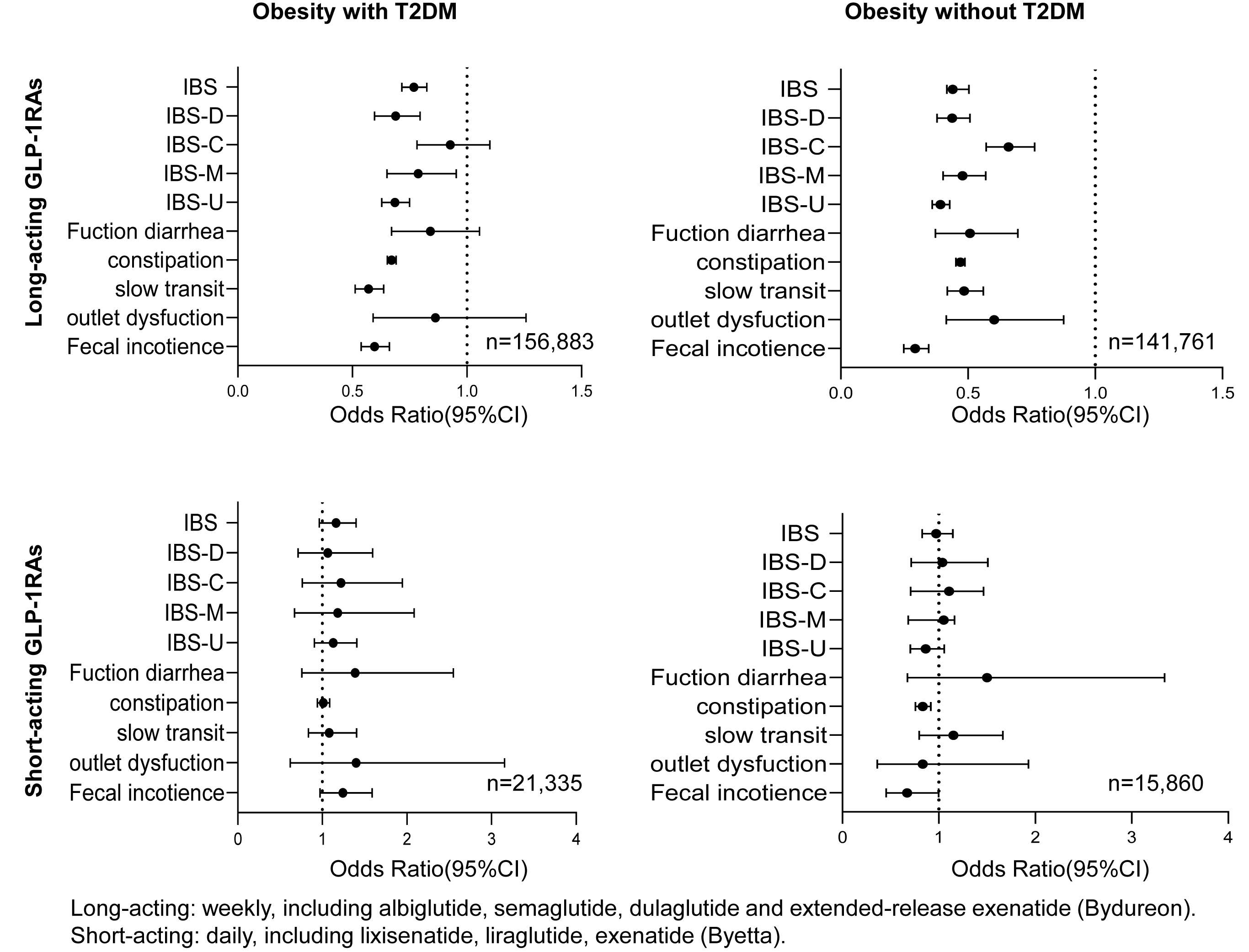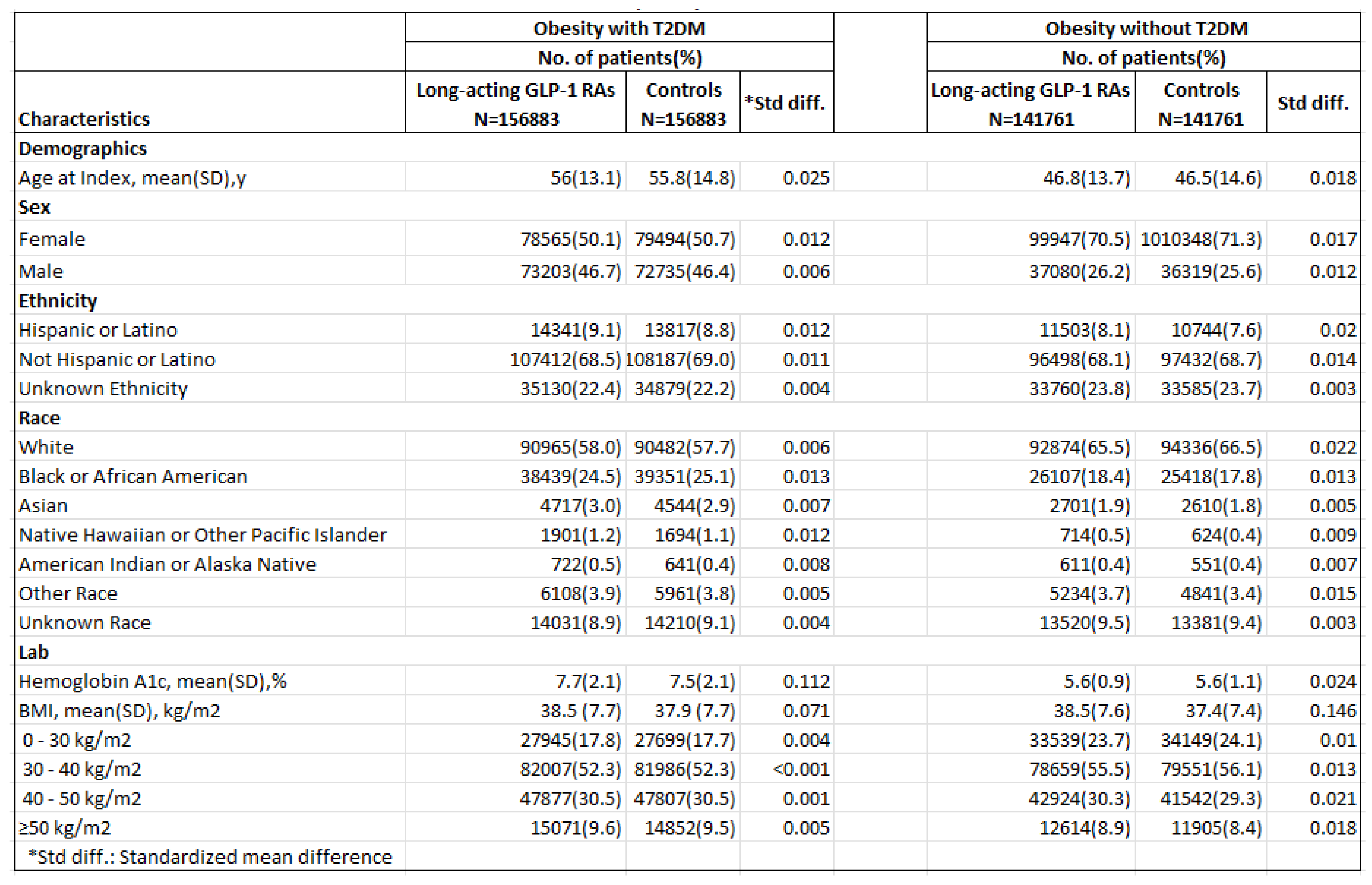Sunday Poster Session
Category: Functional Bowel Disease
P0805 - Long-Acting GLP-1 Receptor Agonists are Associated With a Reduced Risk of Functional Lower Gastrointestinal Disorders in Obese Patients With or Without Diabetes
Sunday, October 26, 2025
3:30 PM - 7:00 PM PDT
Location: Exhibit Hall
- JP
Jin-Xiu Pan, MD (she/her/hers)
Case Western Reserve University
Cleveland, OH
Presenting Author(s)
Jin-Xiu Pan, MD1, Xiaoliang Wang, MD, PhD2, Peng Zeng, MD2, Siming Ma, MD3, Yan Sun, MD3, Gengqing Song, MD, PhD4
1Case Western Reserve University, Cleveland, OH; 2Cleveland Clinic, Cleveland, OH; 3Case Western Reserve University / MetroHealth, Cleveland, OH; 4Case Western Reserve University/Metro Health, Cleveland, OH
Introduction: GLP-1 receptor agonists (GLP-1RAs) are widely used to treat type 2 diabetes mellitus (T2DM) and obesity, conditions commonly linked to functional lower gastrointestinal disorders (FLGDs). Prior studies found modest increases in gastrointestinal (GI) symptoms with GLP-1RAs compared to SGLT2 inhibitors, but only among T2DM patients. Our previous study (GUT, 2024) identified an increased Gastroesophageal Reflux Disease risk associated with short-acting but not long-acting GLP-1RAs in T2DM patients, suggesting effects may differ by medication duration, patient population, and comparator. We examined the associations between short- and long-acting GLP-1RAs and FLGDs in obese populations, both with and without T2DM.
Methods: This retrospective cohort study utilized TriNetX database, identifying adults with outpatient visits from Jan 1, 2015, to Jan 1, 2025. Two populations were included: (1) patients with obesity and T2DM and (2) patients with obesity but without T2DM. Patients prescribed GLP-1RAs (short-acting [daily] or long-acting [weekly]) were propensity-score matched 1:1 to controls without GLP-1RA use based on demographics and relevant confounders. Exclusions included IBS-mimicking conditions, GI surgeries, malignancies, and concurrent GLP-1/GIP dual agonist or DPP-4 inhibitor use. Primary outcomes (constipation, IBS [IBS-D, -C, -M, -U], functional diarrhea, fecal incontinence) were assessed ≥6 months after initiation. Odds ratios (ORs) and 95% confidence intervals (CIs) were calculated.
Results: Each matched cohorts comprised 156,883 obese patients with T2DM and 141,761 without T2DM. In both populations, long-acting GLP-1RAs were significantly associated with reduced risks of constipation (T2DM: OR 0.671, 95% CI 0.652–0.691; non-T2DM: OR 0.470, 95% CI 0.452–0.488), overall IBS (T2DM: OR 0.768, 95% CI 0.716–0.825; non-T2DM: OR 0.471, 95% CI 0.440–0.504), and fecal incontinence (T2DM: OR 0.597, 95% CI 0.538–0.662; non-T2DM: OR 0.336, 95% CI 0.292–0.386). Among patients without T2DM, long-acting GLP-1RAs also reduced risks for all IBS subtypes and functional diarrhea (OR 0.652, 95% CI 0.500–0.850). Short-acting GLP-1RAs showed no significant associations with FLGDs in either population.
Discussion: Long-acting GLP-1RAs reduce FLGD risks across obese populations regardless of T2DM status, while short-acting GLP-1RAs have neutral effects. These findings highlight the importance of GLP-1RA duration, patient population, and comparator selection in evaluating GI outcomes.

Figure: Table 1: Baseline Characteristics in the Propensity Score-Matched Long-acting GLP-1RAs and Control Cohorts

Figure: Figure 1: Odds Ratios and 95% Confidence Intervals for Study Outcomes
Disclosures:
Jin-Xiu Pan indicated no relevant financial relationships.
Xiaoliang Wang indicated no relevant financial relationships.
Peng Zeng indicated no relevant financial relationships.
Siming Ma indicated no relevant financial relationships.
Yan Sun indicated no relevant financial relationships.
Gengqing Song indicated no relevant financial relationships.
Jin-Xiu Pan, MD1, Xiaoliang Wang, MD, PhD2, Peng Zeng, MD2, Siming Ma, MD3, Yan Sun, MD3, Gengqing Song, MD, PhD4. P0805 - Long-Acting GLP-1 Receptor Agonists are Associated With a Reduced Risk of Functional Lower Gastrointestinal Disorders in Obese Patients With or Without Diabetes, ACG 2025 Annual Scientific Meeting Abstracts. Phoenix, AZ: American College of Gastroenterology.
1Case Western Reserve University, Cleveland, OH; 2Cleveland Clinic, Cleveland, OH; 3Case Western Reserve University / MetroHealth, Cleveland, OH; 4Case Western Reserve University/Metro Health, Cleveland, OH
Introduction: GLP-1 receptor agonists (GLP-1RAs) are widely used to treat type 2 diabetes mellitus (T2DM) and obesity, conditions commonly linked to functional lower gastrointestinal disorders (FLGDs). Prior studies found modest increases in gastrointestinal (GI) symptoms with GLP-1RAs compared to SGLT2 inhibitors, but only among T2DM patients. Our previous study (GUT, 2024) identified an increased Gastroesophageal Reflux Disease risk associated with short-acting but not long-acting GLP-1RAs in T2DM patients, suggesting effects may differ by medication duration, patient population, and comparator. We examined the associations between short- and long-acting GLP-1RAs and FLGDs in obese populations, both with and without T2DM.
Methods: This retrospective cohort study utilized TriNetX database, identifying adults with outpatient visits from Jan 1, 2015, to Jan 1, 2025. Two populations were included: (1) patients with obesity and T2DM and (2) patients with obesity but without T2DM. Patients prescribed GLP-1RAs (short-acting [daily] or long-acting [weekly]) were propensity-score matched 1:1 to controls without GLP-1RA use based on demographics and relevant confounders. Exclusions included IBS-mimicking conditions, GI surgeries, malignancies, and concurrent GLP-1/GIP dual agonist or DPP-4 inhibitor use. Primary outcomes (constipation, IBS [IBS-D, -C, -M, -U], functional diarrhea, fecal incontinence) were assessed ≥6 months after initiation. Odds ratios (ORs) and 95% confidence intervals (CIs) were calculated.
Results: Each matched cohorts comprised 156,883 obese patients with T2DM and 141,761 without T2DM. In both populations, long-acting GLP-1RAs were significantly associated with reduced risks of constipation (T2DM: OR 0.671, 95% CI 0.652–0.691; non-T2DM: OR 0.470, 95% CI 0.452–0.488), overall IBS (T2DM: OR 0.768, 95% CI 0.716–0.825; non-T2DM: OR 0.471, 95% CI 0.440–0.504), and fecal incontinence (T2DM: OR 0.597, 95% CI 0.538–0.662; non-T2DM: OR 0.336, 95% CI 0.292–0.386). Among patients without T2DM, long-acting GLP-1RAs also reduced risks for all IBS subtypes and functional diarrhea (OR 0.652, 95% CI 0.500–0.850). Short-acting GLP-1RAs showed no significant associations with FLGDs in either population.
Discussion: Long-acting GLP-1RAs reduce FLGD risks across obese populations regardless of T2DM status, while short-acting GLP-1RAs have neutral effects. These findings highlight the importance of GLP-1RA duration, patient population, and comparator selection in evaluating GI outcomes.

Figure: Table 1: Baseline Characteristics in the Propensity Score-Matched Long-acting GLP-1RAs and Control Cohorts

Figure: Figure 1: Odds Ratios and 95% Confidence Intervals for Study Outcomes
Disclosures:
Jin-Xiu Pan indicated no relevant financial relationships.
Xiaoliang Wang indicated no relevant financial relationships.
Peng Zeng indicated no relevant financial relationships.
Siming Ma indicated no relevant financial relationships.
Yan Sun indicated no relevant financial relationships.
Gengqing Song indicated no relevant financial relationships.
Jin-Xiu Pan, MD1, Xiaoliang Wang, MD, PhD2, Peng Zeng, MD2, Siming Ma, MD3, Yan Sun, MD3, Gengqing Song, MD, PhD4. P0805 - Long-Acting GLP-1 Receptor Agonists are Associated With a Reduced Risk of Functional Lower Gastrointestinal Disorders in Obese Patients With or Without Diabetes, ACG 2025 Annual Scientific Meeting Abstracts. Phoenix, AZ: American College of Gastroenterology.
